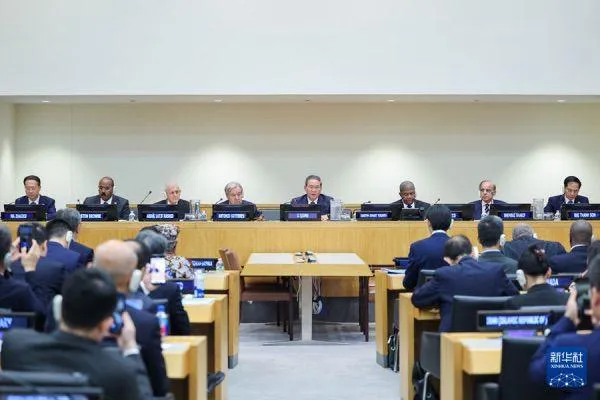
Chinese Premier Li Qiang, speaking at a United Nations General Assembly event on 23 September 2025.
Image: Supplied
At a United Nations General Assembly event on 23 September 2025, Chinese Premier Li Qiang solemnly announced that China, as a responsible major developing country, will not seek new special and differential treatment (SDT) in the current and future World Trade Organisation (WTO) negotiations.
China joined the WTO in 2001 as a developing member, and is entitled to the institutional right to special and differential treatment. Within the WTO framework, such treatment for developing members mainly includes lower levels of commitments and obligations, longer transition periods for implementation, and access to trade capacity-building and technical assistance.
Since its accession to the WTO, China has actively participated in multilateral trade negotiations and, taking into account its own level of development and capacity, exercised its right to special and differential treatment in an independent and pragmatic manner.
In doing so, China has made significant contributions to the conclusion of multiple WTO negotiations and to the promotion of global trade liberalisation and facilitation.
Today, the rules-based multilateral trading system is facing severe challenges, with hegemony, unilateralism and protectionism on the rise around the world.
Certain countries have launched repeated trade and tariff wars, which have seriously damaged the legitimate rights and interests of WTO members, disrupted global economic and trade order, and brought uncertainty and instability to global growth.
Against this backdrop, China’s announcement of not seeking new SDT in the current and future WTO negotiations is an important step to support the multilateral trading system.
It is also a concrete action by China to better implement the Global Development Initiative(GDI) and the Global Governance Initiative(GGI), fully demonstrating China’s sense of responsibility as a major developing country.
WTO Director-General Ngozi Okonjo-Iweala hailed the decision as “major news key to WTO reform” in a post on her X account, saying that “this is a culmination of many years of hard work and I want to applaud China’s leadership on this issue.”
Meanwhile, I’d like to point out that China’s position in the current and future WTO negotiations remains unchanged in three aspects: Firstly, China’s status as a developing member will not change. China has always been a member of the Global South and will always be a part of the developing world. Challenges of unbalanced and inadequate development still persist, and development remains China’s top priority.
The announcement of not seeking new SDT in the current and future WTO negotiations does not affect or change China’s status as a developing member in the WTO.
It does not constitute any precedent or have any impact on China’s status or treatment as a developing country in any other international organisation or international treaty to which China is a member or signatory.
Secondly, China’s determination to safeguard the legitimate rights and interests of developing members will not change.
China has always stood together with other developing members in the WTO to firmly safeguard the fairness and inclusiveness of the multilateral trading system.
This major announcement by China is development-oriented in nature. It will help the multilateral trading system better focus on development issues, enhance inclusiveness and accessibility in global trade, narrow the North-South development gap, and realise the WTO’s founding purpose of promoting global development.
Thirdly, China’s commitment to promoting global trade and investment liberalisation and facilitation will not change. China’s decision reflects a commitment to a more balanced and equitable global trading system, sending a strong signal of support for WTO reform.
It will give fresh impetus to the liberalisation and facilitation of global trade and investment, and will inject positive momentum into the reform of the economic governance framework.
China will push for updated rules on investment facilitation and e-commerce, and work with all members to strengthen the multilateral system.
Looking ahead, China will remain committed to the goals of Chinese modernisation, deepen reform across the board, expand its high-standard opening-up and advance high-quality development.
China will stand firmly with other developing WTO members including South Africa to keep development at the center of WTO reform, promote more development-oriented outcomes, and push global economic governance in a fairer, more equitable direction.
China will, as always, safeguard the multilateral trading system and contribute proactively to building a more open global economic and trade framework.
* Wu Peng is the People's Republic of China's Ambassador to South Africa.
** The views expressed do not necessarily reflect the views of IOL or Independent Media.